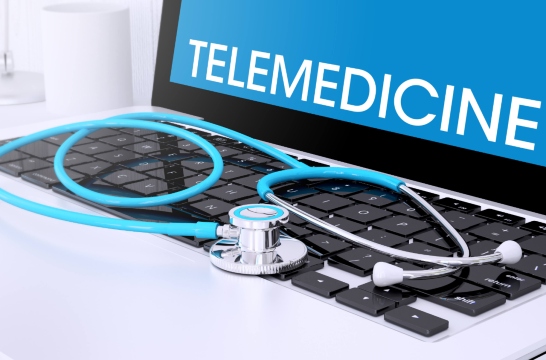Virtual Mesothelioma Treatment Options During COVID-19
Treatment & DoctorsWritten by Sean Marchese, MS, RN | Edited By Walter Pacheco

The coronavirus pandemic and social distancing guidelines have kept some mesothelioma patients from traveling to cancer centers for treatment and keeping doctor appointments.
Like all cancer patients, people diagnosed with malignant mesothelioma are at a higher risk of contracting COVID-19 because of their suppressed immune systems.
However, doctors and patients have found a way to keep their appointments and, in some cases, continue treatment throughout a clinical trial: Telemedicine.
Telemedicine, or telehealth, is giving patients the chance to video chat with their health care providers through their personal mobile devices or computers.
Video Meetings Connect Patients to Doctors
Joan Forbes and her husband, James Watson, who has pleural mesothelioma, recently used a telemedicine tool for a virtual appointment with Dr. Robert Cameron.
Cameron is director of thoracic surgery at the Ronald Reagan UCLA Medical Center.
“It felt like being in the office,” Forbes told The Mesothelioma Center at Asbestos.com of her video meeting. “Dr. Cameron went over our test results and images and saved us over six hours of travel.”
Dr. Bernardo Goulart, a medical oncologist at the Seattle Cancer Care Alliance, has been incorporating telehealth into nearly all his follow-up visits during the pandemic. He believes telehealth can provide patients “safe and effective cancer care” while sparing them from traveling to cancer centers.
“We are able to continue cancer care [through telemedicine] while avoiding excessive risks of transmitting the coronavirus,” Goulart said. “We are still favoring not doing new patient visits through telemedicine because we still value face-to-face interactions with people that we’re getting to know.”
For mesothelioma patient Ken Hockenberry, the greatest benefit of a virtual visit was having the full time of a regular visit without the infection risk of being in the office. His wife, Janet, was grateful to have all the answers she needed when she needed them.
“The doctor was so uplifting,” Janet said. “There wasn’t a time where we felt he had to rush us through it or anything. He sat there and answered every question we had. It kept us safe and I was really happy.”
How Do Virtual Visits Work?
Telehealth technology has been a boon for patients who are unable to travel due to the pandemic. It also allows multiple users to participate, so nurses or multiple doctors can partake in visits alongside family members or friends who might be present for support.
To get started with virtual visits, your cancer treatment center or doctor’s office may provide a guide via email or walk you through the process over the phone to install and set up any required software or applications.
Topics that can be discussed during a telehealth visit include:
- Managing your medications or treatments
- Advice and guidance on nutrition or lifestyle changes
- Consultations with a palliative care specialist
- Clinical research trial opportunities
- Teaching sessions on new therapies or medication
- Genetic counseling or referrals to other specialists
Telemedicine provides your doctors with a picture of your current health. It doesn’t restrict them from reviewing the current blood work or radiology imaging needed to develop your mesothelioma treatment plan.
For example, if you were recently prescribed a new medication and are having side effects, you can discuss in the virtual visit what you are experiencing, present any visual abnormalities and have your medication adjusted.
If patients cannot use telemedicine, they can always use the old-fashioned telephone call to contact their doctors about treatment.
“[Patients] should be in touch with their medical and radiation oncologists for treatment plans and try to minimize unnecessary visits as much as possible,” said Dr. Ory Wiesel, a thoracic surgeon at Maimonides Medical Center in New York. “However, they should keep getting treatment.”
Wiesel stressed that patients should be advised by their doctors during this period.
Cancer Clinical Trials Continue Through Telemedicine
Patients enrolled in clinical research trials may be concerned about their access to care during the pandemic.
However, the National Cancer Institute and the Food and Drug Administration have outlined how telemedicine can help clinical trials continue. Many clinical trial protocols now are allowing the use of virtual visits to accommodate a larger population.
Both agencies explain that telemedicine allows clinical trial patients and their caregivers greater flexibility.
In a press release from March 19, 2020, the NCI reported that they are “closely monitoring the clinical experience of cancer caregivers around the world.” They suggest that study visits conducted by “virtual” or “telemedicine” could be substituted for protocol-required in-person visits.
The NCI states that health care systems should continue to enroll and treat patients in clinical trials, especially in lifesaving circumstances.
Additionally, protocol deviations are being relaxed for delayed or cancelled study activities, such as imaging tests and biospecimen collections, allowing patients to remain on study protocols.
The Future of Telemedicine
The range of possibilities for the expansion of telemedicine continues to grow every day. More patients are connecting with their physicians and treatment centers through video calls and experiencing the benefits of virtual visits.
Trina West Reif lives in Michigan and was diagnosed with mesothelioma in 2001. She has been using the same video technology to see her family and loved ones while staying safe at home.
“I’ll video call my grandkids,” West Reif said. “It’s a great tool.”
Telemedicine technology is also bringing patients together during a time where social distancing is keeping people apart, and the benefits are likely to continue long after the COVID-19 pandemic ends.
“So many of us meso friends in the [mesothelioma support] group are communicating and keeping each other going,” West Reif said. “We have our own little community.”






